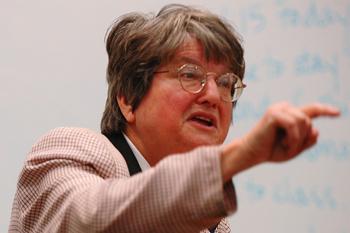Sister Helen Prejean asked the audience to imagine a white man going on trial for the murder of a black man and receiving the death penalty. She paused for a few moments and delivered her message – “You know you can’t.” “Eighty percent of the real practitioners of the death penalty are in the 10 Southern states that practiced slavery the longest – where white people are threatened by people of color,” Prejean said. “That’s directly connected to ‘Who did you kill?'” The Pugh Institute for Justice hosted a lecture Tuesday called “Actual Innocence and the Death Penalty” at the Paul M. Hebert Law Center. The Pugh Institute is an organization that promotes justice for individuals in the criminal and civil justice systems. Prejean spends nine months each year traveling the country to educate the public about the death penalty. She also speaks to death row inmates, their families and victims’ families. Chief Judge Ginger Berrigan of the East District Federal Court introduced Prejean as a “roaming Catholic nun.” Prejean is the author of the 1993 Pulitzer Prize nominated book “Dead Man Walking.” It is a story about two death row inmates and her experiences working with them as their spiritual adviser. One of the inmates, Patrick Sonnier, was convicted and given the death penalty for the kidnap and murder of two teenagers. “Another constitutional decision made during the Rehnquist court was the right to an attorney at trial but not a right to an attorney in post-conviction,” Prejean said. Johnny Taylor, the second person to be executed in Louisiana since 1976, did not have an attorney after his conviction, Prejean said. He was executed without any lawyer trying to file an appeal. After witnessing her first execution, Prejean said she was sickened. Prejean said people do not want to see pain or blood when witnessing an execution. She said people want it to be humane. This idea brought support to lethal injection as a form of capital punishment. Lethal injection is now under scrutiny because it may be a form of cruel and unusual punishment, Prejean said. She said ineffective lawyers have a strong impact in death penalty cases. “A good defense makes a huge difference,” Prejean said. She said when defendants are not given a competent lawyer, the truth will not come out. The Supreme Court said racism is an integral part of the country’s society and history and has to be tolerated, she said. Prejean criticized the Supreme Court for saying this because the words “equal justice under law” is shown on the front of the U.S. Supreme Court building. Another of Prejean’s books, “The Death of Innocents: An Eyewitness Account of Wrongful Executions,” tells the story of Dobie Gillis Williams, a man accused of the rape and murder of Sonja Knippers. Prejean said Williams had an IQ of 65 and a jury convicted him of murder and gave him the death penalty. Two years after Williams’ 1999 execution, the Supreme Court said executing mentally disabled people is unconstitutional. “[Capital punishment] is hugely disproportionate to poor people and minorities,” Prejean said. “We want to correct that now.” Prejean said the Supreme Court never looks at the practical effects of capital punishment. Prejean said the death penalty forces the victims’ parents into a conflict with the defendants’ parents. She said this process has no rational outcome. Death sentences are statistically down and executions are down, she said. Prejean said people are going to end the death penalty before the courts do. “Our courts are not there, the people are getting there,” Prejean said. “My mission is to wake up the people.”
—-Contact J.J. Alcantara at jalcantara@lsureveille.com
Prejean: Racism still strong in U.S. court system
February 20, 2008

Sister Helen Prejean speaks Monday at the Paul M. Hebert Law Center.





